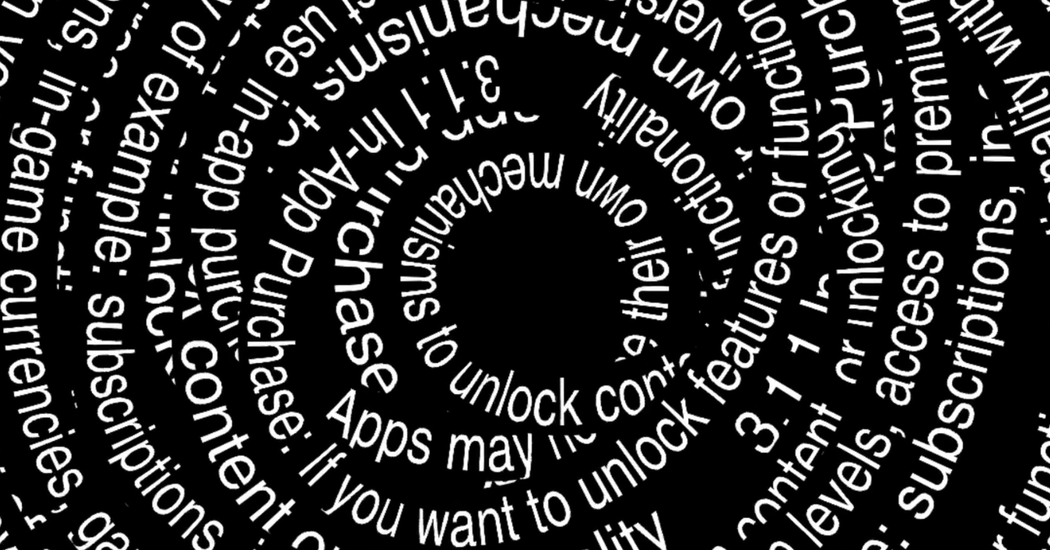
Apps have become a huge economy, but the rules that govern them are nearly impossible to understand.
Apple and Google have twisted their decade-old rules for their app stores like a pretzel to the point where they may no longer make sense. This has made buying digital stuff in apps convoluted as heck.
One example: In theory, although not yet in reality, you can use your Amazon account to buy an e-book from Kindle’s iPhone app. You cannot buy an e-book in the Android version of the app. Until recently, Kindle purchases were effectively a no-go under Apple’s rules but fine under Google’s. Now it’s the opposite.
Confusing? Yep. Apple and Google have written long, complicated guidelines for apps and have frequently revised those rules to protect their own interests. (I’ve noted before that Apple’s app rules are much longer than the United States Constitution.)
Want more zaniness? Today, it’s easy-peasy to pay to subscribe to a podcast in Patreon’s iPhone app. Apple stands aside and allows Patreon to take your personal information and credit card details.
But buying other types of digital subscriptions can be completely different. If you purchase a platinum membership to the dating service Tinder in the iPhone app, you are effectively signing up with Apple, and Tinder is on the sidelines.
Apple takes a chunk of that membership fee forever. If you want to quit, you tell Apple, not Tinder.
Buying a six-month membership through the Tinder app costs some people $14.99 a month, but it’s $13.50 if purchased from the website. (The price difference is Tinder’s way of partly recouping the up-to-30-percent fee it pays Apple for each app purchase.) Oh, and paying to use dating apps might soon work more like paying for stuff in Patreon — but only in the Netherlands.
For now, paying for Tinder through its Android app is more like how Patreon works. But that’s only because Match Group, Tinder’s parent company, has sued Google to stop the company from changing its rules.
{DEEP BREATH.}
I could bore you with details of why Apple makes a distinction between buying a subscription from Patreon and buying one from Tinder. There is logic behind why you can buy a paperback copy of “1984” from Amazon’s Android app but not the e-book edition, and why new Netflix subscribers used to be able to sign up from its Android app but now can’t. Or, sort of can’t. It’s another pretzel twist.
It took me hours of phone calls and sleuthing to figure out all the details in the paragraphs you just read. If so many rules, exceptions and explanations are needed to buy things from an app in 2022, perhaps the logic of the app economy is illogical.
For years, some companies that make apps have griped about how Google and especially Apple control many aspects of this economy. They both dictate which apps we can download easily through their app stores and when they directly handle purchases that we make through apps.
If we use an app to buy stuff that exists in the real world, such as an Uber ride or a meal kit subscription, those purchases bypass Apple and Google. The fight is over buying things that we use digitally, such as a trinket used in a smartphone app game or a dating app subscription.
The problem is that distinctions that seemed sensible when Apple created its app storefront in 2008 don’t necessarily fit the modern digital economy.
I’ve written before about YouTube video creators who can’t understand why Apple or Google is entitled to a chunk of the money — potentially forever — that their fans pay them through an app.
In the Zoom-everything age, does it make sense to have different rules, as Apple sought to have, for, say, buying gym classes to take in person and those you take virtually at home? Why aren’t apps like Facebook that make money from advertisements handing a chunk of revenue to Apple and Google, but those that sell digital subscriptions are?
And the app rules often change, creating more complexity.
This month, Google put in place tighter restrictions so it must handle the purchases of more digital stuff in apps and take a cut.
Again, there is some sense behind all of these pretzel twists. Apple and Google want to avoid letting major smartphone video games, the biggest moneymakers in app worlds, bypass their regulations and fees. And they say they are trying to respond to complaints that they have too much control or that they burden small businesses.
But the more concessions that Apple or Google make to mollify angry governments and some angry developers but not others, the more arbitrary their app store logic can seem.
Before we go …
-
Mark Zuckerberg once said that safeguarding elections was his company’s top priority. My colleagues Sheera Frenkel and Cecilia Kang report that Meta has shifted its focus now, but the risks from bogus online election information remain.
-
This stinks: Reuters spoke to college students who accepted jobs from tech companies like Twitter, Coinbase and Bolt — only to have those job offers rescinded when the companies hit a rough patch. One recent college graduate said she might be forced to leave the U.S. since her job was yanked.
Earlier from On Tech: Tech hiring is still bonkers.
-
Ultra-wide-shot selfies that make people look distorted are totally cool. So writes a certified young person, my colleague Kalley Huang.
Hugs to this
Octopus babies developing in their eggs are eerie and amazing.




